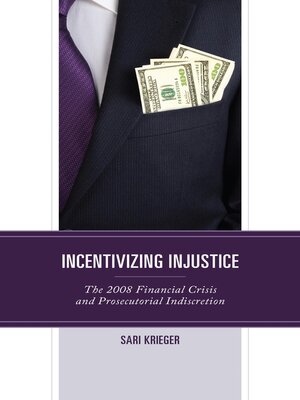Incentivizing Injustice
ebook ∣ The 2008 Financial Crisis and Prosecutorial Indiscretion
By Sari Krieger

Sign up to save your library
With an OverDrive account, you can save your favorite libraries for at-a-glance information about availability. Find out more about OverDrive accounts.
Find this title in Libby, the library reading app by OverDrive.



Search for a digital library with this title
Title found at these libraries:
| Loading... |
In a time of painful economic and legal inequities, we are still plagued by a gnawing question: Why did no major bank executive face any meaningful consequences for the 2008 financial crisis? Meanwhile, average Americans lost 8.8 million jobs and $19.2 trillion in household wealth, with the crisis' impacts still reverberating throughout society. Moving beyond the popular narrative that the rich simply play by different rules, Incentivizing Injustice focuses not on the potential perpetrators, but on the powerful prosecutors deciding who faces charges and who goes home with a fine. In the years leading up to the financial crisis, the Justice Department experienced embarrassing losses and moved a deluge of resources away from everything else to fund post-9/11 counterterrorism. White-collar federal prosecutors found themselves working in an overly-cautious and under-funded institution. At the same time, the lure of defense firms had grown much stronger, offering million-dollar partnerships. Prosecutors had every incentive at this time to improve their image by obtaining big fines with banks through settlements, rather than risking complicated litigation, but at what cost to American justice and trust in the rule of law?






